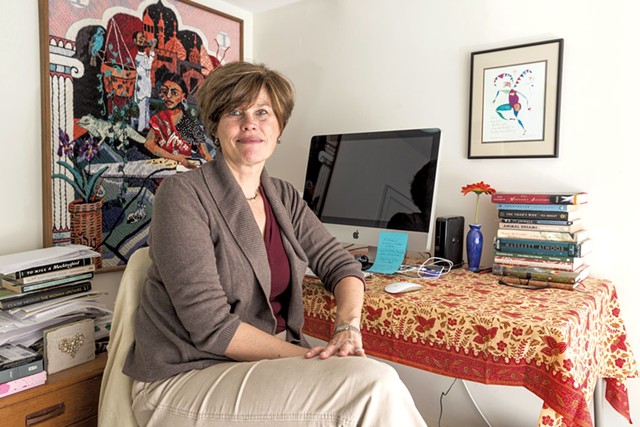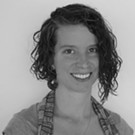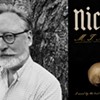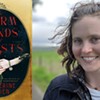Published December 17, 2014 at 10:00 a.m.
When Phish announced their imminent breakup in 2004, Shelagh Connor Shapiro found a novel-worthy idea. The short-story author and MFA graduate from Vermont College of Fine Arts says she read an article about a Vermont farmer who decided not to plant all of his crops that year because he thought he could make more money per acre by opening his land to camping Phish fans.
Shapiro, who lives in the Burlington area, spent a few years thinking and six writing, and that idea became the core of her first novel, Shape of the Sky, published this fall. In it, residents of the fictional town of Resolute, Vt., somewhat reluctantly host a jam-band festival. The complicated past and present conflicts of Resolute's residents resurface as their tiny town is flooded with concert revelers. And then the dead body of a young woman is found.
Shapiro is also the host of 105.9 FM the Radiator's "Write the Book," a show for writers and those interested in books and writing. Since 2008, she's done about 250 shows; recent guests include novelist Meg Wolitzer and National Book Award winner (and fellow VCFA grad) Jacqueline Woodson.
After years of interviewing novelists and poets, Shapiro spent some time on the other side, talking with Seven Days.
SEVEN DAYS: How did "Write the Book" get started?
SHELAGH CONNOR SHAPIRO: I was volunteering at Vermont Public Radio, doing stuff for them in their marketing department. Cheryl Willoughby, a friend of mine, had a music show on the radio. I realized they were taking submissions of ideas, so I submitted an idea of a show that would be for writers and readers who wanted to know more about the writing process. My first guest was David Huddle, who is such a lovely gentleman to talk to, and it went from there. People are very open to being asked to be on the show.
SD: What are some of the most memorable interviews you've had?
SCS: That's hard to narrow down — my favorites fall into three categories. Local authors whom I'd long wanted to meet — Julia Alvarez, who had been a workshop leader at a Bread Loaf conference, Castle Freeman Jr. and Chris Bohjalian.
Another category might be the craft interview; certain writers I've interviewed are also teachers. They're just very good about getting the point across. Sue William Silverman's book Fearless Confessions: A Writer's Guide to Memoir is full of good craft information. Natasha Sajé is a poet — I'm not a poet, so part of what I liked about that interview is learning so much about form in poetry. David Jauss is another one who's just a wonderful teacher.
Third category is the well-known writer whose time is in great demand, who makes himself or herself available for the full show. People like Ann Patchett, Roxana Robinson, Tracy Chevalier, Anita Diamant are really wonderful, generous people who gave me a full show to talk about writing. Those are very wonderful memories.
SD: Shape of the Sky is your first published novel. How has becoming a published novelist changed how you approach and relate to those you interview?
SCS: I think that I have a lot more understanding of what they're going through as far as getting through their book tour and trying to get their work out there [and] recognized. Writers are much more responsible for getting their own work out — we have to more actively sell ourselves than we used to. I sometimes talk more about that with writers because that might not be a part of their natural makeup, not what you expected when you signed up for writing. I like talking about the creative process and working on the next project.
SD: You use a close third-person narrator who focuses on a different character in each chapter. How do you think that narrative choice affects how readers empathize with the characters?
SCS: One thing about the way that it's done is that they all sort of lean on each other — they interrelate. Part of the reason I did that was because I wanted to create a picture of a whole town; the town becomes sort of a character itself. I used the key of fifths [to] divide the chapters by key signatures, which have a major chord and a corresponding minor chord. Each of the major third-person characters has another person who shows up in their chapters — the minor chord of the major chord. I was pleased that to some extent I was letting the structure go where it went. My hope is that the reader will see something unique in each character and will come to relate to them differently.
SD: One of the most engaging story lines in your novel is that of Christine Wheeler, who survives rape and incest by running away from home as a teenager. Decades later, she is still suffering from trauma and fear, which you show in her story. How did you approach writing about rape and its lingering effects?
SCS: I think, no matter what I'm writing, what I really try to focus on is the truth of this character's situation and life. It might be that I'm writing about an interaction between a mother and child, a robbery or something violent; in any setting, I try to be honest. I didn't want to dodge anything with Christine Wheeler — obviously, I wanted to pay respect [to] what she's been through. At the same time, she's come through it, [though] there's sadness in her life, the way that she's living her life now; she's chosen a certain kind of independence. There's definite fallout in her life, but she's a stronger person than she realizes.
I wrote about the rape from the perspective of her already coming through it. It's a scene of memory instead of an active scene, so it's not as graphic as it would have been if there were that immediacy. I didn't want to allude to it subtly, though, because I didn't think that would afford her the respect that she, or people who have been through her situation, [deserve].
SD: Vermont is home to a number of smaller presses, such as Green Writers Press, Chelsea Green Publishing and Wind Ridge Books, which published Shape of the Sky. You've discussed on your show how you were not able to get your first two novels published. What's your take on self-publishing, smaller presses and the struggle for writers to get published?
SCS: It's funny, because I feel like it's changing so fast. I think it's wonderful that writers have the opportunity to self-publish without the stigma that there used to be. There are some beautiful self-published books. I was weighing my options when Wind Ridge offered to publish my book. I think small presses offer great services — editing — but small presses suffer; they are definitely having to figure out how they are going to survive in this big market, and so are big presses, for that matter. Locally, there are fantastic services for people who want to self-publish; people want to guide you. [Writers] think that they've done an adequate job of editing their book, but if you don't have at least one unbiased person look at your book, you're really not doing it justice. You need someone to let you know if it's ready — it might not be ready yet.
SD: What does your writing practice look like?
SCS: I'm not always a daily writer, though I have been writing every day for National Novel Writing Month in November. That has felt really great, even though I'm not going to be finishing a novel in a month, nor would I want to. Right now I'm working on something that I've started four times with four settings and four people. My next project should be out promptly in six years, if I keep up my norm. Trying like mad to write faster, but it doesn't seem to be my speed.
SD: Every week, you give a writing prompt that listeners can incorporate into their writing practice. Which prompts have been the most fruitful for you, or for a writer you know?
SCS: Writing prompts that work best for me tend to be the ones that personalize a specific image, like Write about the kitchen in the house where you grew up. You might not be thinking about that kitchen every day — but because you've been given that specific prompt, it makes for richer writing. A couple people wrote in about the prompt that Sue William Silverman gave — I believe it was a prompt where you take a photograph, and you write about the story that might be going on in that photo, and then write about the story that might be going on outside of that photo.
SD: You've interviewed many authors from Vermont and New England, and Shape of the Sky takes place in rural Vermont. What, or who, excites you in terms of literature coming out of this state?
SCS: Jennifer McMahon had a great book called The Winter People, which was really creepy. I like scary stories — there aren't many for adults. Megan Mayhew Bergman: I think her work is fantastic, just amazing. Julia Alvarez — I will read anything she writes about. Howard Frank Mosher — his work is grounding, very Vermont oriented; it just makes me feel the state so fully. Castle Freeman — he's funny in a kind of dry way that's always enjoyable. He's got a great sense of humor. There's a poet named Daniel Lusk; I really love his work. John Irving, Sydney Lea, Jay Parini — he has a new nonfiction, historical biography of Jesus. David Budbill's poetry is very evocative.
I'd add Thomas Christopher Greene's The Headmaster's Wife, Malisa Garlieb's Handing Out Apples in Eden, and Jessica Hendry Nelson's If Only You People Would Follow Directions to my list of excellent recent Vermont reads. There are so many of them — I'm having trouble coming up with who they all are.
INFO
Shape of the Sky by Shelagh Connor Shapiro, Wind Ridge Books of Vermont, 241 pages. $15.95. "Write the Book" airs on WOMM-LP 105.9 FM every Monday at 2 p.m.
More By This Author
Speaking of...
-

Q&A: As Emoji Nightmare, Cambridge Resident Justin Marsh Brings Drag to Rural Towns
Jul 17, 2024 -

Video: Cambridge Resident Justin Marsh Brings Drag Queens to Rural Towns as Emoji Nightmare
Jul 11, 2024 -

Reading Advocates Celebrate the Passage of Literacy Bill
May 21, 2024 -

Senate Education Committee Advances Literacy Bill
Mar 15, 2024 -

Q&A: Exploring the Haskell Free Library & Opera House With Hannah Miller
Mar 13, 2024 - More »
Comments
Comments are closed.
From 2014-2020, Seven Days allowed readers to comment on all stories posted on our website. While we've appreciated the suggestions and insights, right now Seven Days is prioritizing our core mission — producing high-quality, responsible local journalism — over moderating online debates between readers.
To criticize, correct or praise our reporting, please send us a letter to the editor or send us a tip. We’ll check it out and report the results.
Online comments may return when we have better tech tools for managing them. Thanks for reading.













































